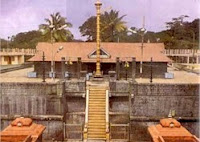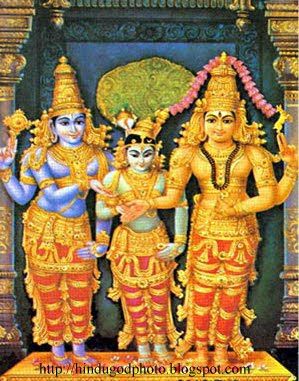Sabarimala (Malayalam: ശബരിമല, Kannada: ಶಬರಿಮಲೆ , Tamil: சபரிமலை, Telugu: శబరిమల) is a pilgrimage centre in Kerala located in the Western Ghat mountain ranges of Kerala in Pathanamthitta District. Lord Ayyappan's temple is situated here in the midst of 18 hills. The area is in the Sahya ranges of Kerala. The temple is situated on a hilltop at an altitude of 914m/3000 ft above mean sea level, and is surrounded by mountains and dense forests. Temples exists in each of the hills surrounding Sabarimala. While functional and intact temples exist at many places in the surrounding areas like Nilackal, Kalaketi, and Karimala, remnants of old temples survive to this day on remaining hills. Sabarimala is believed to be the place where Ayyappan meditated after killing the powerful demon, Mahishi.
Sabarimala is one of the most visited piligrim centres in the world with an estimated 4.5 - 5 crores devotees coming every year. The world's second largest annual pilgrimage (after Hajj in Mecca) is reported to be to Sabarimala.
The pilgrimage to Sabarimala is a singular example of one where pilgrims, without consideration of caste, creed, position or social status, go with one mind and one mantra dreaming constantly of the darshan of the presiding deity at the Holy Sannidhanam. Vehicles can go up to Pamba River. However no girls/women between the age of 12-50 are allowed to visit this temple. This temple is very popular amongst all South Indians. The devotees are expected to follow a vratham(41-day penance), i.e. during this period they are to refrain from meat, fish, alcohol, tobacco, sex, using foul words, refrain from hair cut, shaving and should visit the local temples regularly and wear a special Mala( A garland made of Rudhraksha or Tulasi beads) and only black coloured dresses. Presently the conditions for Vratham are not as strict as it used to be earlier.
There is a place near the temple (east of Sannidhanam), dedicated to the Vavar, a Muslim who was the disciple of Ayyappan, called "Vavarunada". The temple is open for worship only during the days of Mandalapooja (November 15 to December 26), Makaravilakku (January 15) and Vishu (April 14), and the beginning of every month in the Malayalam calendar. Sabari was a devotee of Lord Rama. Her devotion is widely attributed to that of an ideal devotee. Lord Ayyappa wanted his pilgrims to honour the same attributes as that of Sabari and hence the hill on which the temple is situated is known as Sabarimala.
Vehicular traffic cannot go beyond Pampa, situated on the Pampa river valley and the last five kilometres to the shrine can be best reached by trekking. However, porter carried chairs (called as doli locally) are also available for the aged and handicapped pilgrims.

Thereafter, pilgrims have to follow a path approximately four kilometres up a steep hill. The path, now fully cemented, with shops and medical aid by the sides, used to be a mere trail through dense forest.
MAP
Share:























